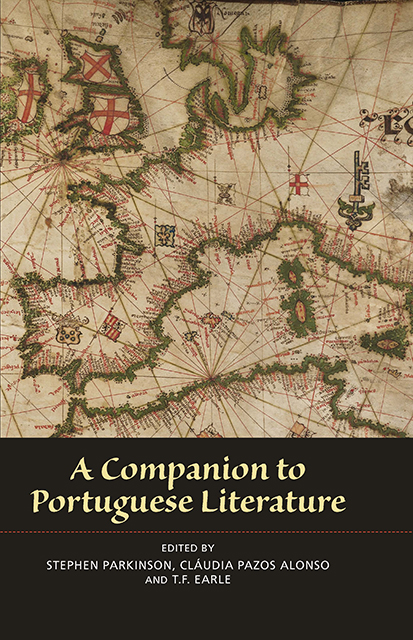Book contents
- Frontmatter
- Contents
- Acknowledgements
- Notes on the Contributors
- Introduction
- 1 Eight Centuries of Portuguese Literature: An Overview
- 2 The Medieval Galician-Portuguese Lyric
- 3 Fernão Lopes and Portuguese Prose Writing of the Middle Ages
- 4 Portuguese Theatre in the Sixteenth Century: Gil Vicente and António Ferreira
- 5 The Lusiads and the Literature of Portuguese Overseas Expansion
- 6 Lyric Poetry in the Sixteenth Century
- 7 The Seventeenth Century
- 8 The Eighteenth Century
- 9 Almeida Garrett: Founder of Modern Portuguese Literature
- 10 The Transition from Romanticism to Realism: Alexandre Herculano, Camilo Castelo Branco and Júlio Dinis
- 11 Eça de Queirós: A European Writer
- 12 Fernando Pessoa and the Modernist Generation
- 13 Narrative and Drama during the Dictatorship
- 14 Women Writers up to 1974
- 15 Writing after the Dictatorship
- 16 Portuguese Literature in English Translation
- Index
3 - Fernão Lopes and Portuguese Prose Writing of the Middle Ages
Published online by Cambridge University Press: 03 March 2023
- Frontmatter
- Contents
- Acknowledgements
- Notes on the Contributors
- Introduction
- 1 Eight Centuries of Portuguese Literature: An Overview
- 2 The Medieval Galician-Portuguese Lyric
- 3 Fernão Lopes and Portuguese Prose Writing of the Middle Ages
- 4 Portuguese Theatre in the Sixteenth Century: Gil Vicente and António Ferreira
- 5 The Lusiads and the Literature of Portuguese Overseas Expansion
- 6 Lyric Poetry in the Sixteenth Century
- 7 The Seventeenth Century
- 8 The Eighteenth Century
- 9 Almeida Garrett: Founder of Modern Portuguese Literature
- 10 The Transition from Romanticism to Realism: Alexandre Herculano, Camilo Castelo Branco and Júlio Dinis
- 11 Eça de Queirós: A European Writer
- 12 Fernando Pessoa and the Modernist Generation
- 13 Narrative and Drama during the Dictatorship
- 14 Women Writers up to 1974
- 15 Writing after the Dictatorship
- 16 Portuguese Literature in English Translation
- Index
Summary
Medieval Portuguese prose writing is dominated by a small number of genres: historical writing, sapiential and memorialistic writing, hagiography and devotional tracts, and romances of chivalry, the latter two firmly rooted in imported and translated materials. Historical writing has a long Iberian lineage, with native Iberian historians such as Lucas of Tuy (Chronicon Mundi, 1232) pre-dating the emergence of Portuguese historiography. The historical compilations of Alfonso X of Castile, notably the General Estoria which Pedro, Count of Barcelos, reworked as the 1344 Cronica Geral de Espanha (General History of Spain), beside his own Livro de Linhagens (Book of Lineages), fed into an ongoing cumulative process of incorporation and reworking of earlier chronicles which had its highest point in the chronicles of the dynastic change of the late fourteenth century, by the first official Royal Chronicler, and keeper of the Royal Archive, Fernão Lopes (?1380–1459).
The first or Burgundian dynasty, descended from Henry of Burgundy, made Count of Portugal under King Alfonso VI of Castile and León in 1097, proceeded largely by direct male succession for nearly three centuries. The only major disturbance had been the civil war of the late thirteenth century in which Afonso III, with Papal support, deposed his brother Sancho II. (The resonances of this conflict, and the many acts of disloyalty or betrayal associated with it, left their mark in satirical lyrics of the period. ‘Not even King Sancho of Portugal was betrayed as I was’, exclaimed Alfonso X in a poem cataloguing the wrongs done to him.)
The events narrated by Fernão Lopes were in many ways a turning point for Portugal. The crisis of succession generated by the premature death of Fernando I in 1383, leaving a ten-year-old daughter betrothed to the King of Castile as part of a peace treaty forced on him by the failure of his last campaign to extend Portuguese territory, led to civil war, invasion by Castile and intervention by English forces, and ultimately the election of Fernando's illegitimate half-brother João of Avis as João I. João's marriage to Philippa of Lancaster, daughter of John of Gaunt, as part of the 1386 Treaty of Windsor which has linked England and Portugal for over six centuries, created a dynasty from which the next ten Portuguese monarchs descended.
- Type
- Chapter
- Information
- A Companion to Portuguese Literature , pp. 45 - 55Publisher: Boydell & BrewerPrint publication year: 2009
- 1
- Cited by

